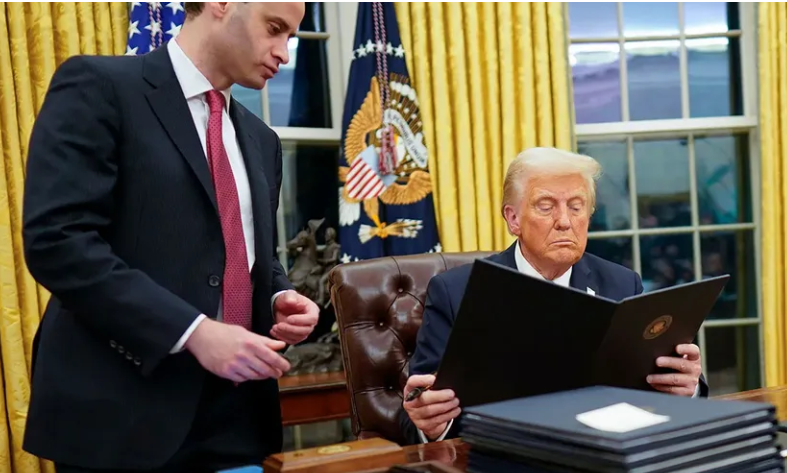Court orders hold on Trump’s medical research funding cuts
Input
Modified
A federal district judge in Boston, United States, has issued an injunction that prevents the National Institutes of Health (NIH) from implementing its proposed $4 billion reduction in research funding. The cutbacks, which were announced on February 7, would have had a substantial impact on prestigious research institutions, such as Johns Hopkins University, Caltech, and MIT. The decision was made in response to a lawsuit filed by Massachusetts and 21 other states, which challenged the 15% limitation on indirect costs that was implemented without consulting affected institutions. The ruling has provisionally protected critical research funding, thereby preventing immediate disruptions to ongoing projects and scientific advancements.

The National Institutes of Health (NIH), a crucial federal agency within the Department of Health and Human Services (DHHS), provides funding for biomedical research throughout the United States. Its grants facilitate the development of innovative remedies for a variety of diseases, drug discoveries, and medical advancements. The limit was defended by the Trump administration, which claimed that certain institutions were overcharging for indirect costs in NIH grant agreements. Essential expenditures, including facility maintenance, administrative expenses, security, and regulatory conformance, are included in these indirect costs. The NIH asserted that the 15% ceiling is consistent with the indirect cost limitations of private research funders such as the Bill & Melinda Gates Foundation. Research institutions, on the other hand, argued that federal grants are subject to stringent regulatory and compliance obligations, which necessitate indirect costs to conduct high-quality research, in contrast to private foundations.

NIH violated the Administrative Procedure Act (APA) by arbitrarily imposing funding cuts without considering institutions' reliance on previous agreements, violating existing APA provisions that prevent sudden policy changes, failing to publish rule changes for public comment, and retroactively applying the new policy to existing grants, according to the lawsuit, which was supported by universities and the American Council on Education (ACE). The Trump administration is required to submit reports every two weeks that provide a detailed account of the National Institutes of Health's compliance with the injunction, as determined by Judge Angel Kelley. The restoration of funding across multiple federal agencies, including the NIH, was also mandated by a separate judgment by Judge John J. McConnell Jr. The broader conflict between the necessity to maintain research and innovation and the governmental cost-cutting measures is underscored by these legal challenges.
Major research universities were at risk of losing millions in funding, which could result in employment losses, lab closures, and a decrease in scientific innovation in the United States. Michigan State University was projected to experience a $27 million loss, Rutgers University a $57 million reduction by 2026, Oregon Health & Science University a $80 million loss, and California State University significant financial setbacks across multiple campuses. Many research programs would have been unable to conduct studies in critical areas, such as cancer treatment, genetic disorders, and neurodegenerative diseases, due to severe financial constraints. Critics cautioned that the reductions would impede essential research on diseases such as cancer, heart disease, and dementia. The potential long-term harm to U.S. leadership in biomedical research, workforce development, and economic innovation was emphasized by the ACE and other organizations. Additionally, they underscored that diminished funding could potentially deter young scientists from pursuing careers in research, thereby influencing the future of American scientific advancement.
The academic and scientific communities enthusiastically embraced the decision to prevent the cutbacks. The importance of indirect costs in the maintenance of the infrastructure required to conduct innovative medical research was underscored by researchers. Universities were granted temporary relief by the ruling; however, there are still reservations regarding the sustainability of future funding. Additionally, legislators expressed bipartisan concerns. Senator Katie Britt of Alabama urged for a more "targeted approach" to prevent the injury of life-saving research, while Senator Bill Cassidy of Louisiana expressed apprehensions about the adverse effect on universities in his state. Senator Susan Collins of Maine was adamantly opposed to the NIH cuts, stating that they would have a catastrophic impact on biomedical research and result in employment losses. The opposition's bipartisanship is indicative of the widespread recognition of the NIH's contribution to the advancement of medicine and the promotion of economic development. According to reports, Collins conversed with Robert F. Kennedy Jr., Trump's nominee for HHS Secretary, who expressed his willingness to reevaluate the policy upon confirmation. His confirmation vote is anticipated to occur shortly, and his perspective on NIH funding may influence the agency's future policies.
The reductions are perceived by scholars, such as Bryan Alexander of Georgetown University, as a component of a more extensive anti-science trend in the United States. The reductions have the potential to erode America's competitiveness in research and development, harm international collaborations, and transfer financial responsibilities to universities. Many institutions may be compelled to pursue private funding, which is frequently more restrictive and less stable, in the absence of sufficient NIH support. The lawsuit seeks to permanently reverse the cutbacks, thereby reaffirming the necessity of consistent NIH funding to preserve America's status as a global leader in medical research. The outcome of this legal dispute could potentially determine whether research institutions continue to receive the necessary government support or experience additional financial instability in the future.
The Trump administration's intention to reduce NIH funding has been halted by the nationwide injunction issued by the federal court, which guarantees that research institutions can continue their operations without any urgent financial constraints. The decision underscores the significance of NIH funding for public health, scientific innovation, and economic stability, as it reflects the pervasive opposition from both Democratic and Republican leaders. Nevertheless, the matter continues to be politically contentious, and the potential for policy changes is contingent upon the confirmation of Robert F. Kennedy Jr. and subsequent legal proceedings. The outcome of this case is expected to establish a precedent for future federal research funding policies, thereby influencing the future of medical innovation and scientific advancement in the United States.
The injunction has garnered an overwhelming amount of public support, particularly among the scientific and medical communities, in addition to its legal implications. The court's intervention has been met with relief by numerous researchers, healthcare professionals, and patient advocacy organizations, who contend that sustained NIH funding is essential for the advancement of public health and the development of new treatments. These cuts would have had an impact on the availability of research-driven medical treatments for millions of patients in the United States and beyond, in addition to their prospective academic consequences. The preservation of funding guarantees ongoing advancements in critical fields, including neurology, oncology, and infectious disease research.
The case has also rekindled debates regarding the government's role in scientific research. While some conservative policymakers contend that restricting indirect costs can aid in the reduction of wasteful spending, numerous experts warn that significant reductions could undermine the stability of the research ecosystem in the United States. A talent outflow could result from the indiscriminate reduction of funds, as top researchers may seek funding opportunities in other countries, thereby eroding the United States' global reputation for innovation.
The long-term implications of the ruling will become more apparent as the case advances. Universities and research institutions continue to advocate for transparent policies that guarantee sustainable and equitable funding mechanisms, remaining vigilant. The result is expected to significantly influence the future of federal research grants and establish a precedent for the implementation of administrative changes to funding policies in the years to come. The preservation of research funding is a critical issue that will significantly impact America's capacity to be a leader in science and medicine for future generations, irrespective of political affiliations.





















